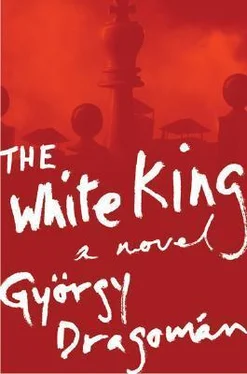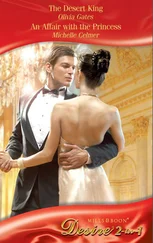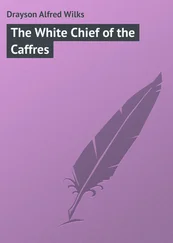The mortuary was dead silent, yes, Father hadn't stirred for at least a minute already, and I thought that maybe he didn't even really see the coffin either, just like he hadn't seen us, but all of a sudden his shoulders twitched and he stepped forward and put his two cuffed hands on the edge of the coffin, and then I knew that he was conscious of what was going on after all, that what he was seeing was sinking in, yes, for a moment I even thought he would take my grandfather's hand, but he grabbed only the edge of the coffin, and then he slowly turned his head and passed his eyes over the length of his father, and his stare fixed itself on the face, and then I looked at my grandfather's face along with him, at the contours of my grandfather's mouth, at how the stubble glistened bluish in one or two spots on the skin sunken under the cheekbones as if he'd just done a clumsy job of shaving, and I knew that Father would look up right away, that he would look again at us, at Mother and me, and I also knew that this time he would recognize us, yes, even if he wouldn't be able to smile he'd recognize us for sure, and he'd know that we were here for him, that we'd been waiting for him and that we would wait until one day they would let him come home forever, and then all of a sudden Father let go of the coffin and took a step back, and he really did look up, right at me, right into my eyes, and I could tell from the sparkle of his eyes that he recognized me, and then his lips parted, and it was obvious he wanted to say something, but he only winced, he couldn't get a word out, and then Mother said through her tears, "My God, what have they done to him? What have they done to the poor thing?" and she let go of my hand and stepped away from my grandmother and headed really fast toward Father, and she was already halfway around the coffin when one of the guards stepped in front of her and snarled, "Approaching a prisoner is not allowed," but then Mother cried out that she wouldn't have them giving her orders, she'd go over to my father, she sure as hell would, they could all go drop dead as far as she was concerned, and she shoved the guard so hard that he reeled back, but then the other guard gave Mother a backhanded slap, at which Father began crying out in a really loud wordless groan and stepped toward Mother before the guard with the chain yanked him back, and then Mother lunged at one of the guards, pounding his chest with her fists, and she shouted for people to help, to not let this happen, and that's when Comrade Bherekméri shouted into the microphone for everyone to stay in their places, to keep calm, and then my grandmother began wailing through her tears, "My son, my little boy, I want to go over to my little boy," and she too headed toward Father, but the guards had already begun wresting Father toward the tapestried door as he pulled with all his might against the chain, snarling and groaning while trying to free himself, but then one of the guards tripped his feet right out from under him, and they went on wrenching him toward the door, two of them were holding Mother by now, and my grandmother shrieked something loud while trying to pull one of the guards off Mother from behind, and then the tapestried door opened up and in stormed the police and the gravediggers, the police were armed with rubber truncheons and the gravediggers with the handles of their spades, and then I looked at all those folks in the mortuary just standing there and staring like they were at some kind of circus, and I shouted at them to do something already, to help, to keep these people from taking Father away, but no one moved, no, they just stood there looking on, and then Comrade Bherekméri's secretary told me to shut up and stop moving this instant, but I turned around and headed for the tapestried door, with Comrade Bherekméri's secretary shouting, "Didn't you hear what I said, stay right where you are!" and he shoved me from behind so hard I almost fell on the coffin, but what did I care, all I wanted was to see what was happening to Mother and Father, and although Comrade Bherekméri's secretary pushed me again, I just kept looking, I didn't see Mother anywhere but I did see Father, the guards were dragging him out the tapestried door, and after leaning down and snatching up the crowbar the gravediggers had left by the coffin, I took off after Father, except that by then the tapestried door had closed and the police were blocking it, so I knew I'd never get out that way even if I tried, and when Comrade Bherekméri's secretary now stepped in front of me I swung the crowbar at his thigh and he doubled up, swearing away, and then I turned around and jumped off the platform, and while swinging the crowbar high I cried out for everyone to make way, to stand aside, and I began clearing a path for myself toward the exit, like in school when we used to fight with the older students in the old air-raid shelter during the main recess. I didn't watch to see where the crowbar was going, no, I kept my eyes fixed only on the crowbar itself to be sure to swing it just right, jabbing and hitting as I went on ahead, with my eyes now also on the main door, and by then everyone was shouting like mad, but I didn't pay them any attention, not even when someone gave me a kick from behind, no, because by then I was already by the exit, in front of the closed double door, which opened just a crack when I gave it a kick, allowing me to slip out and kick the door shut behind me, and although I knew they'd open the door in no time and come after me, what did I care, I could hear everyone inside yelling and screaming away, and then I stepped forward and stopped on top of the steps, I turned completely around but couldn't see Father anywhere, not him and not the guards either, the whole cemetery was empty except for all those cars lined up one behind the other on both sides of the main promenade, and then for a moment I again thought that maybe I was just imagining the whole thing, that they hadn't brought Father home after all, but then a gray prison van turned out from behind the mortuary and began snaking its way down the main promenade, and I cried out for them to stop, to wait, and I started running after the van, and I knew it was about to speed up, but when I then glimpsed Father's bone-white face behind the bars of the rear window, I also knew that the prison van could go as fast as it wanted, I'd catch up anyway, and raising the crowbar above my head, I took off after the van, faster and faster, faster and faster and faster I ran.
Though set in a nameless land, The White King is inspired by Communist-era Romania — more specifically, by that almost mythical expanse of western Romania called Transylvania, which is home to various ethnic groups, Hungarians and Romanians most prominent among them. To Hungarian readers this variegated cultural-linguistic setting is apparent in the characters' names; all of them, regardless of origin, appear as per Hungarian orthography, since this novel was written in that language. The one exception, because the English spelling captures the essence of the original while also being fairly pronounceable, is the name of the narrator himself: Djata.
Readers wishing to imagine how the names sound in Hungarian may consult the list below.

Acknowledgments
As small boy I was a great fan of James Fenimore Cooper's The Last of the Mohicans. I was convinced that this book, like all others, of course, had been written in Hungarian. Until the moment I picked it up in a different Hungarian translation, stunned and angered to find a different book rendered in different words. This experience shook me to the core, introduced me to the issue of translation, and made me understand that a translation of a novel is nothing short of a rebirth. So I'd like to thank all those who taught me about this and those who helped in publishing an English version of The White King: Nathaniel Rich, Radhika Jones, Philip Gourevitch, Anjali Singh, Jane Lawson, Janet Silver, Evan McGarvey, Géza Morcsányi, Katharina Raabe, Eva Schwartz, Istvan Géher, Ádám Nádasdy, Peter Doherty, and Ferenc Takacs. I'd also like to express my gratitude to my agent, Chris Parris-Lamb, for doing such an incredible job and being a true pathfinder. But above all, I have to thank another keen woodsman, the translator Paul Olchváry, for his unparalleled dedication and enthusiasm. Nagyon köszönöm!
Читать дальше













